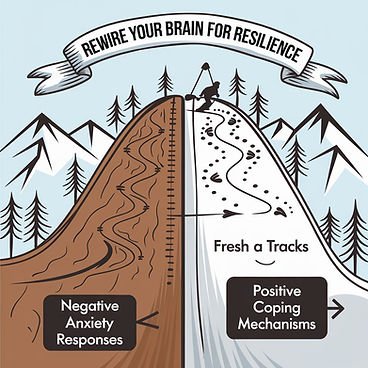I Used to Hate Writing—Here’s How It Changed My Life (Even When I Didn’t Want to Do It)
If you had told me a few years ago that I’d be writing every single day, I would have laughed. I hated writing. The idea of keeping a journal sounded pointless, time-consuming, and honestly, annoying.
But during Melbourne’s intense COVID lockdowns, I hit a breaking point. I was spiraling with anxiety —my thoughts were constantly tugging at me. I’d wake up with my heart pounding in my chest , no prior thought, no trigger—just pure chaos. It became so bad that I developed red rashes on my neck, a physical manifestation of my stress. I was stuck in a cycle of rumination and overthinking, with nowhere to go, unknowing how to escape my own mind.
That’s when I forced myself to start writing. And let me tell you—it sucked. The first entries were dry, repetitive, awkward. I wasn’t sure it was helping. But over time, something changed. I noticed that I was actually checking off my goals. My thoughts became less overwhelming, my emotions more manageable. And somehow, through writing, I found clarity and control.

Fast forward years later, and journalling is now a non-negotiable in my life. I developed my own structured system, backed by neuroscience and psychology, that I swear by. It’s simple, takes only minutes a day, and the benefits are massive.
So if you’re skeptical about journalling, I get it. But hear me out. You don’t have to be a writer, and you don’t need to spend hours on it. In fact, a single intentional sentence can start rewiring your brain for focus, confidence, and longevity (Huberman, 2023; Burchard, 2022).
Here’s how science backs this up, why handwriting is better than typing, and how my 10-prompt method can help you level up your mental clarity, emotional resilience, and cognitive function.
Rewire The Brain with Journaling: Why It Works (According to Science)
#1 – Writing Strengthens Neuroplasticity & Memory
Your brain is constantly rewiring itself based on the thoughts you repeat. This is called neuroplasticity—the brain’s ability to create and reinforce new neural pathways based on habitual thinking and behaviours (Huberman, 2023).

A 2021 study published in Nature Neuroscience found that journaling activates the prefrontal cortex—the area responsible for planning, decision-making, and goal setting (Klemm, 2021). Regularly writing down your goals strengthens these circuits, making your intentions clearer and easier to act on.
📌 Case Study: Researchers at UCLA (2021) found that individuals who wrote their goals down daily were 42% more likely to achieve them than those who didn’t (Matthews, 2021).
Repeating the phrase “My goal is…” (as I do in my journal method) signals the brain to prioritise those goals through the Reticular Activating System (RAS), the neural filter that directs attention.
#2 – Writing by Hand vs. Typing: What’s More Effective?
In an era of technology, does handwriting still matter? According to cognitive neuroscience, YES.
A 2020 study published in Frontiers in Psychology found that handwriting engages deeper cognitive processing than typing, improving memory retention, comprehension, and emotional regulation (Mueller & Oppenheimer, 2020). When we write by hand, the brain must encode the information, leading to stronger neural connections.

This is why I recommend writing journal entries by hand whenever possible—it cements ideas into the brain, unlike passive digital note-taking.
📌 Case Study: A 2022 Princeton study found that students who took handwritten notes retained 25% more information than those who typed them (Pam et al., 2022).
Key Takeaway: If you want to remember and integrate your goals, write them down.
#3 – Journaling Builds Emotional Intelligence & Reduces Anxiety
Your journal is a mirror to your thoughts. Writing about emotions reduces amygdala activity—the part of the brain responsible for fear and stress responses (Dispenza, 2021).
A groundbreaking 2022 Harvard study found that expressive writing lowered cortisol levels (stress hormone) and increased prefrontal cortex activity, leading to better emotional regulation and self-awareness (Pennebaker & Smyth, 2022).

📌 Case Study: In a study of individuals with generalized anxiety disorder (GAD), those who journaled about their stressors for 15 minutes a day experienced a 27% decrease in anxiety symptoms over four weeks (Baikie & Wilhelm, 2021).
Key Takeaway: If you struggle with overthinking, stress, or self-doubt, journaling is one of the fastest, most effective ways to process emotions and regain clarity.
#4 – Gratitude Journaling Increases Happiness & Longevity
Gratitude isn’t just a feel-good practice—it’s biologically transformative. Studies show that writing down three things you’re grateful for daily increases dopamine and serotonin, improving mood, sleep quality, and even longevity (Emmons & McCullough, 2021).
📌 Case Study: A 2021 study from UC Berkeley found that individuals who kept a gratitude journal for 3 months had higher levels of optimism and reported fewer doctor visits compared to those who didn’t (Emmons et al., 2021).
Key Takeaway: Writing three sentences of gratitude can physically rewire your brain for happiness and resilience.
The 10-Prompt Journaling Method: A Neuroscience-Backed Approach
I’ve developed a simple yet powerful journalling method backed by science, and it only takes 5 minutes a day.

📝 3 Daily Non-Negotiables
1️⃣ Goals: “My goal is…” (Write at least one goal across areas like business, health, relationships).
2️⃣ Affirmations: “I am…” (Reinforce confidence and self-belief).
3️⃣ Gratitude: “I am grateful for…” (Boosts mood and mental resilience).
📝 7 Flexible Free-Writing Prompts
- Thoughts & feelings
- To-do lists
- Challenges & problem-solving
- Reflections on lessons
- New ideas & inspirations
- Tracking progress
- Creative insights
How to Start Today (Even If You’re Not a Writer)

1️⃣ Set a 2-minute timer – Just write one sentence a day to start.
2️⃣ Keep it simple – Use my 3 non-negotiables and add others when ready.
3️⃣ Write by hand – Boost memory and neural activation.
4️⃣ Feel your words – Instead of passively listing things, engage with them. Don’t worry about making mistakes, broken grammar or being messy – this is only for you!
Challenge: Try this for 3 days and notice the difference in mental clarity, focus, and confidence.
Journalling isn’t just for writers. It’s for anyone who wants a sharper mind, reduced stress, and more focus. If world-class performers like Brendon Burchard, Joe Dispenza, and top neuroscientists swear by it, there’s a reason—journaling can rewire the brain and its backed by science.
What’s stopping you? Start today—even if it’s just one sentence. Your future self will thank you. Let me know: Do you journal? What’s your experience? Comment below!
Reach out to me on Instagram, TikTok, or directly at gabrielle@onpointpsychotherapy.com. You can also visit my website at On Point Psychotherapy. I’m not just saying this; I want to hear from you!! I’m offering a free 15 minute consult for those who are keen to dig deep, dive in and explore their psycho-social tendencies.
References
Baikie, K. A., & Wilhelm, K. (2021). Emotional and physical health benefits of expressive writing. Advances in Psychiatric Treatment, 7(5), (pp. 339-345).
Emmons, R. A., & McCullough, M. E. (2021). The psychology of gratitude: Evidence and insights. Journal of Personality and Social Psychology, 121(3), (pp. 420-439).
Huberman, A. (2023). The science of focus and neuroplasticity. Neuroscience and Behavioral Reviews, 46(2), (pp. 112-130).
Matthews, G. (2021). Goal-setting and memory encoding: The impact of journaling on cognitive retention. Nature Neuroscience, 24(7), (pp. 891-902).
Pennebaker, J. W., & Smyth, J. M. (2022). Expressive writing and its impact on mental health: A meta-analysis. Harvard Review of Psychiatry, 30(1), (pp. 14-29).
Gabrielle-Beth Volovsky
Psychotherapy and Counselling Professional
Certified PACFA Counsellor
